I have been researching the Plotly-Dash library not too long ago. There was a callback problem on the second graph .. I can't figure out what is the reason. I have been understanding the components for a long time but have not found the reason. However, in the first graph, the callbacks do work.
here is my code:
import dash
import dash_core_components as dcc
import dash_html_components as html
from dash.dependencies import Input, Output
import plotly.graph_objs as go
import sqlite3
import pytz
import pandas as pd
import numpy as np
from datetime import datetime
external_stylesheets = ['https://codepen.io/chriddyp/pen/bWLwgP.css']
app = dash.Dash(__name__)
def get_value(n_intervals):
timezone = pytz.timezone("Etc/UTC")
utc_from = datetime(2021, 3, 23, tzinfo=timezone)
base = sqlite3.connect('base_eurousd.db')
cur = base.cursor()
read_db = cur.execute('SELECT * FROM data_eurusd').fetchall()
df = pd.DataFrame(read_db)
df[0] = pd.to_datetime(df[0], unit='ms')
df[3] = np.where(df[1].diff().lt(0) | df[2].diff().lt(0), df[3] * -1, df[3])
return df
def get_value_analyze(n_intervals):
timezone = pytz.timezone("Etc/UTC")
utc_from = datetime(2021, 3, 23, tzinfo=timezone)
base = sqlite3.connect('base_eurousd.db')
cur = base.cursor()
read_db = cur.execute('SELECT * FROM data_eurusd').fetchall()
res = pd.DataFrame(read_db)
res[0] = pd.to_datetime(res[0], unit='ms')
res[3] = np.where(res[1].diff().lt(0) | res[2].diff().lt(0), res[3] * -1, res[3])
funcs = {
"bid_open": (1, 'first'),
"bid_close": (1, 'last'),
"tiks": (0, 'size'),
"ask_open": (2, 'first'),
"ask_close": (2, 'last'),
"bid_min": (1, 'min'),
"bid_max": (1, 'max'),
"ask_min": (2, 'min'),
"ask_max": (2, 'max'),
"qvant": (3, 'quantile'),
"sred": (3, 'mean'),
"skew": (3, 'skew'),
">0": (3, lambda x: x.lt(0).sum()),
"=0": (3, lambda x: x.eq(0).sum()),
"<0": (3, lambda x: x.gt(0).sum())
}
res1 = res.groupby(pd.Grouper(key=0, freq="1T")).agg(**funcs)
return res1
def serve_layout():
return html.Div(
children=[
html.H4(children='111'),
html.Div(id='my-id', children='''EURUSD'''),
dcc.Graph(id='example-graph', animate=True, responsive=True),
dcc.Interval(
id='interval-component',
interval=3 * 1000,
n_intervals=0,
),
html.Div(id='my-id2', children='''NO UPDATE'''),
dcc.Graph(id='example-graph-2', animate=True, responsive=True),
dcc.Interval(
id='interval-component2',
interval=3 * 1000,
n_intervals=0,
),
],
)
app.layout = serve_layout
@app.callback(
Output('example-graph', 'figure'),
[Input('interval-component', 'n_intervals')])
def update_graph(n_intervals):
df = get_value(n_intervals)
return \
{
'data': [
{'x': df[0], 'y': df[1], 'type': 'line', 'name': 'BID'},
],
'layout': go.Layout(xaxis=dict(range=[min(df[0]), max(df[0])]),
yaxis=dict(range=[min(df[1]), max(df[1])]), )
}
@app.callback(
Output('example-graph-2', 'figure'),
[Input('interval-component2', 'n_intervals')])
def update_graph_2(n_intervals):
res1 = get_value_analyze(n_intervals)
return \
{
'data': [
{'x': res1[0], 'y': res1[3], 'type': 'line', 'name': 'ТИК'},
{'x': res1[0], 'y': res1[10], 'type': 'line', 'name': 'КВАНТИЛЬ'},
{'x': res1[0], 'y': res1[11], 'type': 'line', 'name': 'СПРЕД'},
{'x': res1[0], 'y': res1[12], 'type': 'line', 'name': 'SKEW'},
{'x': res1[0], 'y': res1[13], 'type': 'line', 'name': 'МЕНЬШЕ НУЛЯ'},
{'x': res1[0], 'y': res1[13], 'type': 'line', 'name': 'МЕНЬШЕ НУЛЯ'},
{'x': res1[0], 'y': res1[14], 'type': 'line', 'name': 'РАВНО НУЛЮ'},
{'x': res1[0], 'y': res1[15], 'type': 'line', 'name': 'БОЛЬШЕ НУЛЯ'},
],
}
if __name__ == '__main__':
app.run_server(debug=True)
Please tell me the solution to this problem?
This Error:
[2021-06-28 23:16:10,613] ERROR in app: Exception on /_dash-update-component [POST]
Traceback (most recent call last):
File "C:\Users\neket\AppData\Roaming\Python\Python39\site-packages\pandas\core\indexes\base.py", line 3080, in get_loc
return self._engine.get_loc(casted_key)
File "pandas\_libs\index.pyx", line 70, in pandas._libs.index.IndexEngine.get_loc
File "pandas\_libs\index.pyx", line 101, in pandas._libs.index.IndexEngine.get_loc
File "pandas\_libs\hashtable_class_helper.pxi", line 4554, in pandas._libs.hashtable.PyObjectHashTable.get_item
File "pandas\_libs\hashtable_class_helper.pxi", line 4562, in pandas._libs.hashtable.PyObjectHashTable.get_item
KeyError: 0
The above exception was the direct cause of the following exception:
Traceback (most recent call last):
File "C:\Users\neket\AppData\Local\Programs\Python\Python39\lib\site-packages\flask\app.py", line 2447, in wsgi_app
response = self.full_dispatch_request()
File "C:\Users\neket\AppData\Local\Programs\Python\Python39\lib\site-packages\flask\app.py", line 1952, in full_dispatch_request
rv = self.handle_user_exception(e)
File "C:\Users\neket\AppData\Local\Programs\Python\Python39\lib\site-packages\flask\app.py", line 1821, in handle_user_exception
reraise(exc_type, exc_value, tb)
File "C:\Users\neket\AppData\Local\Programs\Python\Python39\lib\site-packages\flask\_compat.py", line 39, in reraise
raise value
File "C:\Users\neket\AppData\Local\Programs\Python\Python39\lib\site-packages\flask\app.py", line 1950, in full_dispatch_request
rv = self.dispatch_request()
File "C:\Users\neket\AppData\Local\Programs\Python\Python39\lib\site-packages\flask\app.py", line 1936, in dispatch_request
return self.view_functions[rule.endpoint](**req.view_args)
File "C:\Users\neket\AppData\Local\Programs\Python\Python39\lib\site-packages\dash\dash.py", line 1079, in dispatch
response.set_data(func(*args, outputs_list=outputs_list))
File "C:\Users\neket\AppData\Local\Programs\Python\Python39\lib\site-packages\dash\dash.py", line 1010, in add_context
output_value = func(*args, **kwargs) # %% callback invoked %%
File "C:\Users\neket\OneDrive\Рабочий стол\MT5 CODE\TEST_PANDAS_DASH.py", line 120, in update_graph_2
{'x': res1[0], 'y': res1[3], 'type': 'line', 'name': 'ТИК'},
File "C:\Users\neket\AppData\Roaming\Python\Python39\site-packages\pandas\core\frame.py", line 3024, in __getitem__
indexer = self.columns.get_loc(key)
File "C:\Users\neket\AppData\Roaming\Python\Python39\site-packages\pandas\core\indexes\base.py", line 3082, in get_loc
raise KeyError(key) from err
KeyError: 0
Output from df:
0 1 2 3
0 2021-06-30 18:33:24.471 1.18550 1.18552 2
1 2021-06-30 18:33:26.073 1.18552 1.18555 6
2 2021-06-30 18:33:26.173 1.18553 1.18555 2
3 2021-06-30 18:33:26.273 1.18553 1.18554 -4
4 2021-06-30 18:33:26.381 1.18552 1.18554 -2
... ... ... ... ..
36331 2021-07-01 07:50:54.126 1.18489 1.18491 2
36332 2021-07-01 07:51:01.297 1.18489 1.18491 2
36333 2021-07-01 07:51:13.108 1.18489 1.18493 4
36334 2021-07-01 07:51:16.078 1.18490 1.18493 2
36335 2021-07-01 07:51:31.511 1.18489 1.18493 -2
Output from res1:
bid_open bid_close tiks ask_open ... skew >0 =0 <0
0 ...
2021-06-28 08:30:00 1.19259 1.19259 5 1.19263 ... -0.567163 2 0 3
2021-06-28 08:31:00 1.19259 1.19269 57 1.19261 ... -0.182745 25 0 32
2021-06-28 08:32:00 1.19269 1.19278 90 1.19272 ... -0.008905 44 0 46
2021-06-28 08:33:00 1.19278 1.19277 62 1.19281 ... 0.010950 31 0 31
2021-06-28 08:34:00 1.19277 1.19282 61 1.19281 ... 0.033526 31 0 30
... ... ... ... ... ... ... .. .. ..
2021-06-28 17:14:00 1.19254 1.19248 157 1.19255 ... -0.050396 76 0 81
2021-06-28 17:15:00 1.19248 1.19257 81 1.19252 ... -0.161537 36 0 45
2021-06-28 17:16:00 1.19258 1.19247 107 1.19260 ... 0.046116 54 0 53
2021-06-28 17:17:00 1.19247 1.19275 77 1.19250 ... -0.415599 29 0 48
2021-06-28 17:18:00 1.19275 1.19304 68 1.19278 ... -0.398739 26 0 42
[529 rows x 15 columns]
Link to base : https://cloud.mail.ru/public/gtDi/BCgw1Jk8r
